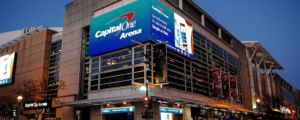The Washington, D.C. Council gave initial approval in a narrow vote to a bill that would allow Intralot, the operator of the D.C. lottery, to become the sole operator of a mobile sports betting platform Feb. 5.
The bill, introduced by Councilmember Jack Evans (D-Ward 2), would give Intralot a monopoly over the creation and operation of mobile-based sports betting in the District. The proposed legislation enables Intralot to run a mobile sports betting platform that would allow residents and visitors to cast bets on games from anywhere in D.C., including their homes or hotel rooms.
Titled the Sports Wagering Procurement Practices Reform Exemption Act of 2019, the bill would also allow private businesses, such as fantasy sports providers DraftKings and FanDuel, to apply for licenses to operate brick-and-mortar sports betting facilities throughout D.C. These facilities would not be allowed within two blocks of four stadiums and arenas that were granted unique privileges, including Nationals Park, Audi Field, Capital One Arena and St. Elizabeths East Entertainment and Sports Arena.

As a result of legalized sports betting, D.C. would take in money through license fees and a 10 percent tax on betting facilities’ earnings. The legislation could bring the District approximately $92 million over the next four years, according to D.C. radio station WAMU.
One million dollars of proceeds raised annually from sports betting would go to toward expanding affordable child care options in D.C., and funding violence prevention programs under the Neighborhood Engagement Achieves Results Act, which uses a public health approach to reduce violence. An additional $200,000 would help fund gambling addiction treatment, according to The Washington Post.
By opening up the market to multiple apps offered by private operators, D.C.’s revenue from legal sports betting would drop to $26 million over the same period, according to WAMU. However, private operators such as FanDuel believe privately-run apps will generate more money for the District because a competitive market will enable more betting, according to DCist.
FanDuel has hired local consultants to speak with every member on the D.C. Council to persuade them to amend the legislation. The company hopes residents will be able to legally engage in sports betting via private companies’ apps anywhere in the District instead of betting exclusively through the D.C. lottery apps, a representative from the company wrote in an email to The Hoya. FanDuel is not likely to suffer significant financial losses if the legislation is passed, according to the representative.
Six council members voted against the bill, including Councilmember David Grosso (I-At Large). Grosso is opposed to legalizing sports betting because of the higher risks of gambling addiction among individuals in low income neighborhoods, Communications Director Matthew Nocella wrote in an email to The Hoya.
This bill comes as numerous states consider legislation that would enable them to gain financial benefits from the sports betting industry. Last May, the U.S. Supreme Court overturned a 35-year-old law that had banned sports betting in every state except Nevada.
On Dec. 18, D.C. joined seven states in legalizing sports betting by passing the Sports Wagering Lottery Amendment Act of 2018, which is set to take effect June 6 after the 30-day congressional review period, in which Congress can decide to block the bill. This legislation would be the first to legalize a new form of gambling in D.C. since voters approved a lottery in 1980.
Legalizing sports betting in the District is a necessary step to modernization, Executive Director of the Office of Lottery and Charitable Games Beth Bresnahan said in a Jan. 28 testimony to the D.C. Council’s Committee on Finance and Revenue.
“The Lottery’s current gaming system contract with Intralot, which expires on March 29, 2020, did not contemplate sports wagering when it was procured nearly 10 years ago,” Bresnahan said. “This new contract is essential to implementing sports wagering and modernizing the Lottery.”
Numerous pieces of legislation over past decades that would have legalized various forms of gambling in the District have been introduced but ultimately failed. While proponents of these efforts argued gambling would bring D.C. much-needed revenue, others, including civic associations and faith-based groups, argued these laws would promote crime and pull money from low-income residents, according to DCist.
The legalization of sports betting will help stimulate the local economy and attract consumers, Evans said.
“We take the first steps towards capturing this exciting new stream of revenue,” Evans said in a Sept. 18 news release. “The city should take advantage of our ability to act before the Maryland or Virginia legislatures to create a thriving sports betting market, which will attract consumers to the District and generate more revenue for district residents.”
The Council has to vote on the bill a second time before it can be sent to D.C. Mayor Muriel Bowser (D) for approval. A second review date has not yet been set.




















